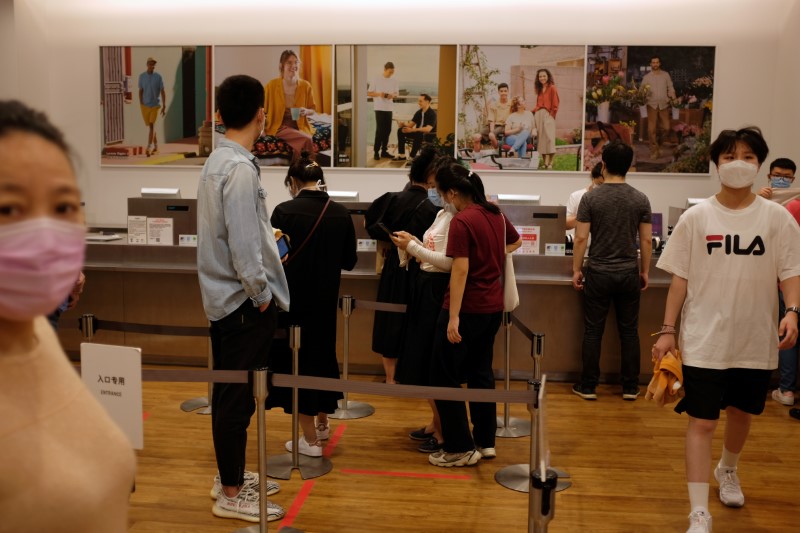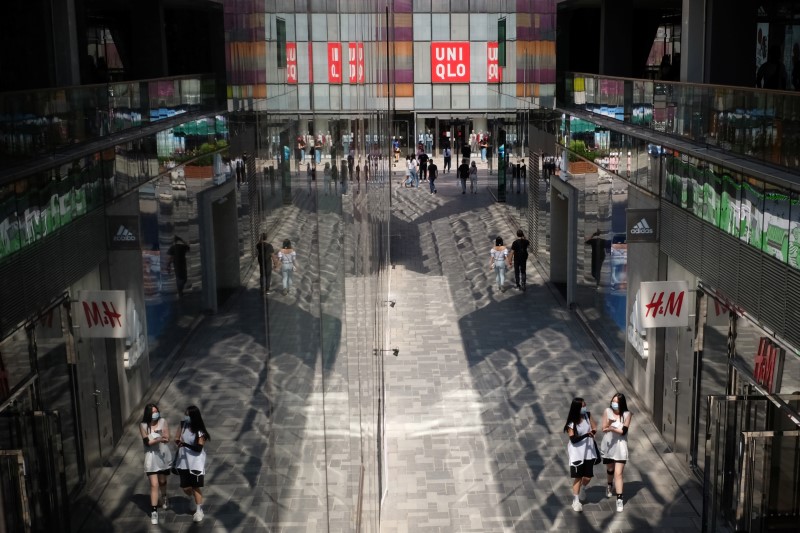By Ritsuko Ando and Sophie Yu
TOKYO/BEIJING (Reuters) - The coronavirus pandemic is shredding the global apparel industry, stripping hundreds of billions of dollars from sales and thrusting big names like J.Crew into bankruptcy protection.
While no major fashion firms have been spared, Japan's Fast Retailing (T:9983), owner of the Uniqlo brand and not far behind the world's No. 2 H&M (ST:HMb) in sales, looks well placed to cope with the crisis better than rivals.
That's thanks to legions of faithful Chinese fans like 25-year-old IT worker Niu Ran, whose wardrobe is crammed with Uniqlo basics like shirts and socks and was looking for more in a post-lockdown shopping trip.
"I like Uniqlo because it's very easy to match and the quality is not bad," he said, waiting in line to try on pants at a Uniqlo store in Wangfujing, Beijing's prime shopping district.
"It satisfies all my needs, so I don't need to spend time elsewhere."
Led by Tadashi Yanai, Japan's richest man, Fast Retailing has expanded aggressively in China with 750 Uniqlo stores, roughly the same number in its home market.
Mainland China has all but contained domestic transmission of the coronavirus with lockdowns lifted in most areas since March and the world’s no. 2 economy is widely expected to emerge from pandemic-induced pain faster than other countries.
In other parts of Asia too, key markets such as Japan, South Korea and Taiwan have been more successful than the West in curbing the virus.
In contrast, rivals mostly focused on the U.S. market like Gap Inc (N:GPS) or far more dependent on Europe like Zara-owner and industry leader Inditex (MC:ITX) and H&M, are expected to face a longer downturn.
"Asia is going to be much faster to bounce back in terms of willingness to spend, which will favour operators with a big presence in Asia," said Honor Strachan, retail analyst at research firm GlobalData.
"In the mature western markets across Europe, the U.S. and Canada, we expect the recovery to be long and drawn out," she said.
GlobalData predicts the global apparel market will lose $297 billion in revenue this year due to the pandemic, with the United States accounting for 42% of that lost spending.
Of Uniqlo's 2,260 stores globally, just 51 are in the United States. Its inability to make strides in the world's biggest clothing market has long been seen as an Achilles heel, but for the time being it may prove a blessing.
Asia, however, accounts for three-quarters of Uniqlo's annual revenue and Greater China alone represents 20%.
While Strachan notes H&M and Inditex are some of the most resilient players in the market, Asia & Oceania make up just 15% of H&M's annual revenue while at Zara, its "Asia and the rest of the world" category accounts for 23% of sales.
THE BASICS ADVANTAGE
Uniqlo's long shelf-life items like Oxford shirts for work, chinos and underwear as well as its reputation for value for money are likely to resonate with consumers grappling with lost income or less job security more than the trend-based clothing of Zara and H&M, according to analysts.
"The quality is good and designs are classic," said Jiang Xin, an internet company employee in Beijing, one of many Chinese shoppers interviewed by Reuters who said they felt Uniqlo quality was a cut above comparably priced brands.
Although Fast Retailing warned in April operating profit could slide 44% in the year to end-August, analysts expect a quick recovery assuming key markets are not hit by a large second wave of infections. With a large proportion of items no-frills basics, it is hoping to limit discounts.
"We will be looking to gradually sell off the excess stock to normalise inventory over the next 18 months," CFO Takeshi Okazaki said on a call with analysts in April.
Fast Retailing declined to comment further on its business outlook for this article.
Rapid growth has brought Fast Retailing almost neck and neck with H&M. Last year the Japanese firm was more profitable with net income of around $1.5 billion compared to the Swedish chain's $1.4 billion, though its $21 billion in revenue was some $3 billion less.
And while it still has a way to go before it matches Inditex's annual sales of $31 billion, Yanai's long-held goal of making Fast Retailing the world's biggest retailer has looked less far-fetched in recent years.
But for that to happen, Uniqlo will have gain market share in the United States, analysts say, adding that it may have to offer more stylish items to get there.

"They still need to find a way to compete in the U.S.," said Jefferies (NYSE:JEF) analyst Michael Allen. "The current crisis doesn't change the equation for that."
